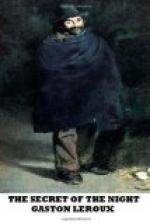In the center of the room a small table stood, quite bare and without any apparent purpose.
On the right was another table with paper, pens and ink-stands. It was there that Rouletabille was conducted and asked to be seated. Then he saw that another man was at his side, who was required to keep standing. His face was pale and desperate, very drawn. His eyes burned somberly, in spite of the panic that deformed his features Rouletabille recognized one of the unintroduced friends whom Gounsovski had brought with him to the supper at Krestowsky. Evidently since then the always-threatening misfortune had fallen upon him. They were proceeding with his trial. The one who seemed to preside over these strange sessions pronounced a name:
“Annouchka!”
A door opened, and Annouchka appeared.
Rouletabille hardly recognized her, she was so strangely dressed, like the Russian poor, with her under-jacket of red-flannel and the handkerchief which, knotted under her chin, covered all her beautiful hair.
She immediately testified in Russian against the man, who protested until they compelled him to be silent. She drew from her pocket papers which were read aloud, and which appeared to crush the accused. He fell back onto his seat. He shivered. He hid his head in his hands, and Rouletabille saw the hands tremble. The man kept that position while the other witnesses were heard, their testimony arousing murmurs of indignation that were quickly checked. Annouchka had gone to take her place with the others against the wall, in the shadows which more and more invaded the room, at this ending of a lugubrious day. Two windows reaching to the floor let a wan light creep with difficulty through their dirty panes, making a vague twilight in the room. Soon nothing could be seen of the motionless figures against the wall, much as the faces fade in the frescoes from which the centuries have effaced the colors in the depths of orthodox convents.
Now someone from the depths of the shadow and the appalling silence read something; the verdict, doubtless.
The voice ceased.
Then some of the figures detached themselves from the wall and advanced.
The man who crouched near Rouletabille rose in a savage bound and cried out rapidly, wild words, supplicating words, menacing words.
And then — nothing more but strangling gasps. The figures that had moved out from the wall had clutched his throat.
The reporter said, “It is cowardly.”
Annouchka’s voice, low, from the depths of shadow, replied, “It is just.”
But Rouletabille was satisfied with having said that, for he had proved to himself that he could still speak. His emotion had been such, since they had pushed him into the center of this sinister and expeditious revolutionary assembly of justice, that he thought of nothing but the terror of not being able to speak to them, to say something to them, no matter what, which would prove to them that he had no fear. Well, that was over. He had not failed to say, “That is cowardly.”




